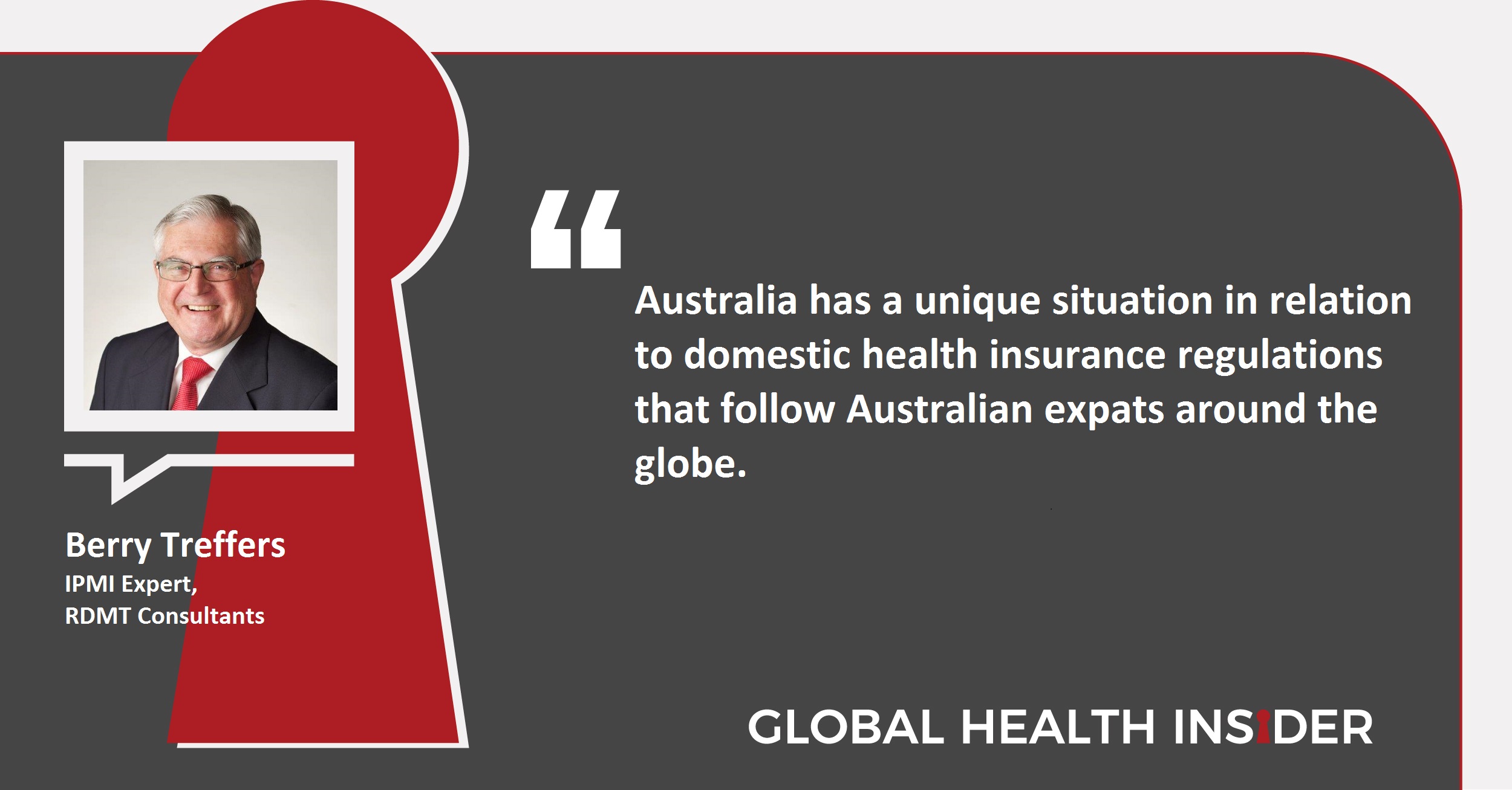IPMI Expert, Berry Treffers Shares his Experiences, Insights, Insider Tips, and Information about Australian Insurance Regulations that Affects Expats

We’ve had the privilege to have Mr Berry Treffers, an IPMI and expat benefits expert for an interview. Mr Treffers has had more than 25 years of experience in expat health insurance and management through some of the biggest insurance companies, such as Marsh, and Willis Towers Watson.
Mr Treffers now has an Expat Consultancy company, RDMT Consultants which provides independent insurance products and services for the international mobility market. Learn more about Mr Treffers and his insights in his full interview below.
Mr Treffers also provided us with an exclusive document about the National Health Act Legislation Issues unique to Australian Expats on International Assignment. To read the full document, click here.
Q: Can you tell us more about yourself and RDMT Expat Consultants?
A: My Name is Berry Treffers, and my trading name is RDMT Consultants as authorised representative of Health Insurance Consultants Australia Pty Ltd. (HICA) HICA was established in 1984 as experts in the domestic health insurance market. When at Marsh
I’ve specialised in Expatriate Health Insurance since the inception of expatriate health insurance in Australia in 1991 when I established the International Health Practice for Mercer Marsh in Australia specialising in designing, implementing, managing and administering international medical and health insurance programs for many of Australia’s largest companies.
In 2000 I retired but didn’t enjoy it. Went out as a consultant and joined Willis Tower Watson in July 2001 to establish their Expatriate Risk Practice in Australia.
I retired from Willis in December 2015 and in conjunction with HICA established RDMT Consultants as a specialist in Expatriate Risk.
Until 1991 companies employing expatriate staff utilised self-insured domestic private health funds to provide international benefits for expatriate employees.
Expatriate insurance in Australia.
In 1991 the Commonwealth Government introduced legislation banning self-insured private health funds and required the introduction of expatriate health insurance. At the time, there were no International health funds, as we know them today, licensed to trade in Australia. This is still the case today except for Bupa International who utilises an Australian insurer as a fronting company.
In addition, Australia has a unique situation in relation to domestic health insurance regulations that follow Australian expats around the globe.
Benefits under the Australian health system stop at the border but connectivity to the Australian health system is permanent and follows Australian expatriates around the world.
All Australian expatriates, eligible for Medicare, are affected by measures, introduced through Commonwealth Government legislation, designed to encourage Private Health Fund membership in Australia.
This legislation is not a matter of choice and doesn’t stop at the border. There are no exceptions.
As most Australian citizens do not understand the Australian health system and its regulations, we have made it our business to be the experts and thus concentrate on Australian companies
Click & Like on LinkedIn
Q: What are the major changes that you’ve seen in the IPMI industry over the years?
A: Australian regulations regarding unauthorised insurers and health insurance regulations that affect all Australian expatriates have ensured that the local expatriate health insurance providers remain the dominant insurers.
International Health Insurers such as Bupa Global and Cigna have endeavoured to enter the Australian market but have made little or no inroad into the Australian market. Most expatriate programs are held by Australian authorised insurers. This applies to
- Australian expatriates on international assignment and,
- Expatriates coming into Australia where a minimum level of cover is a compulsory requirement including maternity benefits. Pre-existing have a 12-month waiting period but thereafter are fully covered regardless of the pre-existing medical condition.
All International Health funds are classed as Unauthorised or Direct Offshore Foreign Insurers
There are limited exemption arrangements available for Direct Offshore Foreign Insurers however their use is restricted to a very limited number of companies as the requirements are a turnover of $200 million or more. Total assets in Australia of $200 million or more than 500 employees.
Australian expatriate policies have built-in limitations that are not suitable for some requirements.
Some of these limitations are:
- Policy age limit is age 65 – can be endorsed to age 70 but that requires annual underwriting.
- Australian insurers have no preferred provider networks overseas.
- War and terrorism risk is generally excluded.
Hence companies that require customised policies can use companies such as BUPA Global- Cigna, Aetna, etc. but even then, have to go through hoops.
- It starts with a letter to the CEO outlining that this is a foreign insurer, not controlled by APRA as to the capability of paying claims with jurisdiction offshore. This letter acknowledging this must be signed by the CEO
- Application to Apra as to why we can’t use an Australian registered insurer and so on.
- This must be repeated every renewal.
Q: What are the emerging trends that you are seeing in the industry now?
A: At this stage, we don’t see any change in the Australian market as such, unless an international health insurer enters the Australian market we cannot see any change in the near future.
Q: What advice would you give to IPMI industry newcomers?
A: We have had several approaches from overseas insurers wanting to do expatriate health business in Australia as an off-shore insurer
When we ask questions – Example below, it all becomes too difficult.
1) What market are they seeking to sell to
2) What cover are they offering
3) What is their premium structure
4) Why should we use their product when we can place with a local Underwriter
5) We must declare the premiums in our 701 bi - annual report to APRA
6) This may cause ASIC / Apra to put us under the microscope – which we do not want!
7) How are they going to settle their claims – locally or overseas – by whom- Australia has no preferred provider network as our National Health Act Legislation does not allow this.
8) Do they have adequate resources to meet their liabilities – what are the regulations – Prudential controls in the country of registration.
9) What happen if they go into liquidation
10) Clients will not have FOS (Financial Ombudsman Service) to call on if they have a complaint regarding the Company this could potentially involve us in a PI claim.
Q: What can we expect from RDMT this year?
A: Keep building RDMT Consultants as the go-to people for expatriate advice – We have made it our business to be the experts in expatriate health in Australia and have built a network of contacts in the International mobility sector, such as Visa, relocation, cultural briefings, International tax etc.


Leave a Comment
* Fields marked with this asterisk are mandatory.